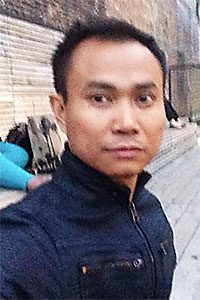
Forty years after the student massacre at Thammasat University, it seems as if our political leaders have learned nothing from it. The same vicious cycle of state-sponsored violence has persisted, letting those in power get away with their crimes.
That is the take I got from attending a seminar at Thammasat University last Saturday on the culture of impunity and political violence in Thailand to mark the 40th anniversary of the 1976 student massacre. While I was too young to have my own memories of the October bloodshed, my memories of a similar event are still fresh.
I still recall the evening of May 19, 2010, when my editor rang me, telling me to leave the red-shirt protest site in Bangkok's Ratchaprasong area to avoid breaking a curfew just announced by the government. As I was walking away from the scene, I heard the sound of gunfire, right in the heart of Bangkok. The shooting took place as the military started to reclaim the demonstration site.

Surasak Glahan is deputy oped pages editor, Bangkok Post.
The day after, I went back to the scene by Wat Pathum Wanaram only to see a row of dead protesters wrapped in white linen.
How could such a brutal and violent crackdown on political activists take place in the heart of the capital, taking innocent lives? Almost 100 people were killed and around 1,500 injured in political violence and crackdowns from April to May 2010. Didn't we learn from the 1976 slaughter, or even the Black May massacre in 1992? How could such a shooting spree have been allowed to take place?
Academics who shared their views on Saturday pointed out that our brutal history keeps repeating itself because none of the perpetrators of these horrors are brought to justice. Had those involved in the 1976 and 1992 bloodbaths been held accountable, we may not have seen the 2010 mass killing.
Hold no grudges and move on. A systematic Thai culture of impunity seems to encourage this behaviour. Deeply rooted in our social norms and questionable legal standards, the culture of impunity has let culprits off the hook. Their actions have either been legalised by amnesty laws or whitewashed by fact-finding missions.
Two years after the 1976 crackdown, the coup's perpetrator passed an amnesty law to pardon all parties involved in the incident.
"It is privileged impunity. The higher rank in society they have, the higher level of impunity they have," Thongchai Winichakul, one of the 1976 student activists, told the crowd on Saturday. Such impunity has become institutional, he said, allowing several governments to "lie" about their violations of human rights.
The judiciary has merely accepted this and other laws and orders as something legitimate. That means no one can demand accountability from the state.
The demonisation of victims has historically justified violence, Thammasat lecturer Prajak Kongkirati said. The tactic was used against student activists in 1976 who were branded as communists. The same approach was used during the colour-coded political conflicts of the past decade, he said. In its most recent form, the politics of the People's Democratic Reform Committee portrayed the red-shirt protesters as "evil and foolish".
Such a prejudice is reflected in the final report of the Truth for Reconciliation Commission tasked with investigating the 2010 crackdown. Even though the Abhisit Vejjajiva government did not pass any amnesty law, the report helped whitewash the event and spared government and security officers from being held accountable, said Puangthong Pawakapan, a Chulalongkorn University political scientist.
"The report doesn't mention that it was a shoot to kill strategy, not shoot to defend," she said
The commission's final report lessened the degree of violence. It pointed out that "men in black" mingled with the protesters, triggering the use of force by soldiers.
The National Human Rights Commission also reached a similar conclusion, saying that the red-shirt protesters should be held accountable.
Ms Puangthong, who also took part in an independent fact-finding committee set up by civil society groups, said her team's report indicated that over 87% of the deaths were caused by gun shots. This report said the other probes opted to overlook key pieces of evidence, especially the mobilisation of 67,000 soldiers, with 117,923 rounds of ammunition for the crackdown.
Their own prejudice against the red shirts clouded their judgement which ended up in discriminatory report conclusions, she said.
As Thailand has gone through a series of bloody political crackdowns, it seems like we have become a nation that tends to easily forgive, but eventually allow the same mistakes to take place again and again.
Section 44 of the interim charter is the latest example of the same vicious cycle. It allows the regime to suppress political opponents, locking them up in jails and banning them from expressing political views. And none of us can demand justice for them.
